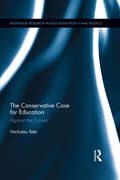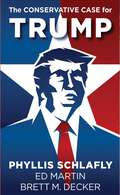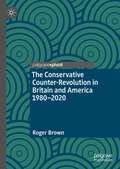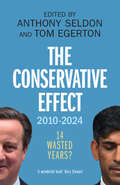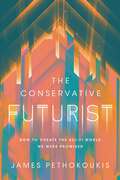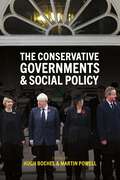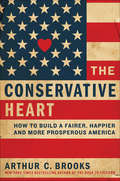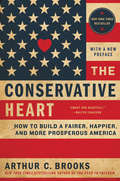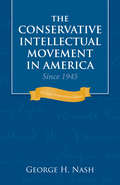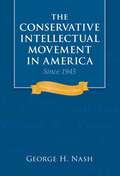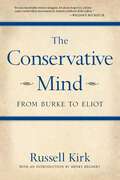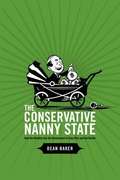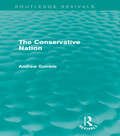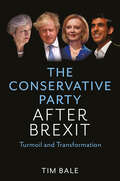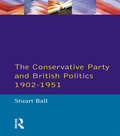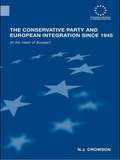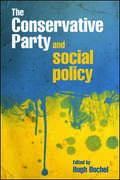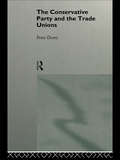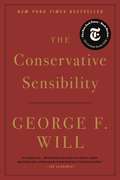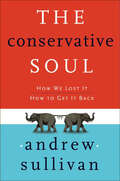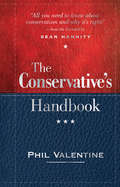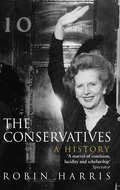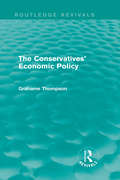- Table View
- List View
The Conservative Case for Education: Against the Current (Routledge Research in Education Policy and Politics)
by Nicholas TateThe Conservative Case for Education argues that educational thinking in English-speaking countries over the last fifty years has been massively influenced by a dominant liberal ideology based on unchallenged assumptions. Conservative voices pushing against the current of this ideology have been few, but powerful and drawn from across the political spectrum. The book shows how these twentieth-century voices remain highly relevant today, using them to make a conservative case for education. Written by a former government adviser and head teacher, the book focuses on four of the most powerful of these conservative voices: the poet and social critic T. S. Eliot, the philosopher Michael Oakeshott, the political thinker Hannah Arendt and the educationist E D Hirsch. In the case of each thinker, the book shows how their ideas throw fresh light on contemporary educational issues. These issues range widely across current educational practice and include: creativity, cultural literacy, mindfulness, the place of religion in schools, education for citizenship, the teaching of history and Classics, the authority of the teacher, the arguments for and against a national curriculum, the educational response to cultural diversity, and more. A concluding chapter sums up the conservative case for education in a set of Principles that would be acceptable to many from the Left, as well as the Right of the political spectrum. The book should be of particular interest to educators and educational policy makers at a time when ‘conservative’ governments are in power in the UK and the USA, as well as to researchers, academics and postgraduate students engaged in the study of educational policy, or those studying educational issues from an ethical, philosophical and cultural standpoint.
The Conservative Case for Trump
by Brett M. Decker Phyllis Schlafly Ed MartinFrom Phyllis Schlafly, the woman whose celebrated classic A Choice Not An Echo (over 3 million copies sold) upended the 1964 Republican Convention, comes a persuasive new argument for a surprising conservative choice: Donald Trump.If you can’t stand Hillary Clinton, but wonder if you could vote for Donald Trump, you need to buy this book.In it, you’ll learn from conservative icon Phyllis Schlafly-lawyer, bestselling author, and "sweet- heart of the Silent Majority”-why Donald Trump is worthy of every conservative’s vote.Joined by Ed Martin, the former head of the Missouri Republican Party, and Brett Decker, formerly an editorial writer with the Wall Street Journal and the Washington Times, Schlafly presents the real Trump, the Trump she and her colleagues have met with and interviewed, the Trump who is far more conservative than you think.In The Conservative Case for Trump, Schlafly reveals:1. How Trump’s appointees to the Supreme Court (on which Schlafly advised him) could be the most consequential in a century2. How, unlike any other Republican, Trump could actually fix the nation’s immigration mess3. Why his economic platform could spark an economic revival on the scale of the Reagan boom of the 1980s (it is based on much the same plan)4. How Trump will defend the First Amendment-guaranteeing freedom of speech and religion-against an ever more dictatorial Left5. Why Trump’s fresh thinking on defense and foreign policy is long overdue-and could send terrorism into rapid retreatDonald Trump is the most controversial Republican presidential candidate since Barry Goldwater, and could be the most conservative and successful since Ronald Reagan. Phyllis Schlafly makes an irrefutable case that needs to be shared with every wavering voter. Nothing less than the future of our country is at stake. If you buy only one political book this year, it has to be The Conservative Case for Trump.
The Conservative Counter-Revolution in Britain and America 1980-2020
by Roger BrownThis book assesses the impacts of the right within the US and UK, forty years on from their initial effects upon economic and social orthodoxies. It argues that one way of understanding the main developments in the political economies of the major Anglophone countries during these decades is to see them as a conservative reaction to the New Deal and the Welfare State, and the associated growth in state intervention, expenditure and regulation. The recent rise in ‘authoritarian populism’ can be seen as a popular response to the policies associated with this reaction, the response being exploited by populist demagogues like Donald Trump, Boris Johnson and Marine Le Pen. Written in a lively and engaging manner, this book will be of interest to academics and students in politics, economics, sociology and contemporary history, as well as general readers.
The Conservative Effect, 2010–2024: 14 Wasted Years?
by Anthony Seldon Tom EgertonAfter fourteen years of Conservative government, we rightly ask what changed for the better or worse during this prolonged period of power? The country experienced significant challenges including austerity, Brexit and Covid: did they militate against the government's making more lasting impact? Bringing together some of the leading authorities in the field, this book examines the impact of Conservative rule on a wide range of economic, social, foreign and governmental areas. Anthony Seldon, Tom Egerton and their team uncover the ultimate 'Conservative effect' on the United Kingdom. With powerful insights and fresh perspectives, this is an intriguing study for anyone seeking to understand the full scope of the Conservative government's influence on our nation. Drawing the immediate lessons from the last fourteen years will be pivotal if the country is to rejuvenate and flourish in the future.
The Conservative Environmentalist: Common Sense Solutions for a Sustainable Future
by Benji BackerA young, conservative environmentalist provides an intrepid vision for both solving our climate crisis and prioritizing the American national interest.Politicians, pseudo-experts, and other partisans have led us to believe that there are only two approaches to climate change: doomerism or denial. Benji Backer, Founder and Executive Chairman of the American Conservation Coalition, argues that both are dead ends. In The Conservative Environmentalist, he delivers an entirely new strategy to take care of the planet while putting put the economic interest of the American people first. Backer makes the compelling case that conservative principles are the key to climate solutions that actually work. In this book, you&’ll visit the country&’s most diverse ecosystems and consequential manufacturing hubs—from Utah coal mines and Texas oil fields to Louisiana wetlands and Rhode Island offshore wind farms—witnessing the power of individual entrepreneurship and local problem-solving. You&’ll be inspired by groundbreaking efforts to strengthen earth&’s ecosystems (that Green New Dealers and other Big Government advocates would prefer to keep hidden), like partnerships between oil and gas companies and environmental nonprofits to preserve thousands of acres of wetlands. Drawing on cutting-edge science, a deep understanding of local community needs, and his experience rallying politicians on both sides of the aisle to take action, Backer offers hope for everyone who cares about the state of the great outdoors. Fascinating, clear-headed, and full of surprises, The Conservative Environmentalist is the fresh, audacious approach needed to ensure a sustainable future, and particularly one that works for America.
The Conservative Futurist: How to Create the Sci-Fi World We Were Promised
by James PethokoukisDiscover the surprising case for how conservatism can help us achieve the epic sci-fi future we were promised. America was once the world&’s dream factory. We turned imagination into reality, from curing polio to landing on the Moon to creating the internet. And we were confident that more wonders lay just over the horizon: clean and infinite energy, a cure for cancer, computers and robots as humanity&’s great helpers, and space colonies. (Also, of course, flying cars.) Science fiction, from The Jetsons to Star Trek, would become fact. But as we moved into the late 20th century, we grew cautious, even cynical, about what the future held and our ability to shape it. Too many of us saw only the threats from rapid change. The year 2023 marks the 50th anniversary of the start of the Great Downshift in technological progress and economic growth, followed by decades of economic stagnation, downsized dreams, and a popular culture fixated on catastrophe: AI that will take all our jobs if it doesn&’t kill us first, nuclear war, climate chaos, plague and the zombie apocalypse. We are now at risk of another half-century of making the same mistakes and pushing a pro-progress future into the realm of impossibility. But American Enterprise Institute (AEI) economic policy expert and long-time CNBC contributor James Pethokoukis argues that there&’s still hope. We can absolutely turn things around—if we the people choose to dream and act. How dare we delay or fail to deliver for ourselves and our children. With groundbreaking ideas and sharp analysis, Pethokoukis provides a detailed roadmap to a fantastic future filled with incredible progress and prosperity that is both optimistic and realistic. Through an exploration of culture, economics, and history, The Conservative Futurist tells the fascinating story of what went wrong in the past and what we need to do today to finally get it right. Using the latest economic research and policy analysis, as well as insights from top economists, historians, and technologists, Pethokoukis reveals that the failed futuristic visions of the past were totally possible. And they still are. If America is to fully recover from the COVID-19 pandemic, take full advantage of emerging tech from generative AI to CRISPR to reusable rockets, and launch itself into a shining tomorrow, it must again become a fully risk-taking, future-oriented society. It&’s time for America to embrace the future confidently, act boldly, and take that giant leap forward.
The Conservative Governments and Social Policy
by Hugh Bochel and Martin PowellFocusing on the policy approaches of Conservative governments since 2015, this book examines key social policy areas including education, health, housing, employment, children and young people, and more. Respected social policy researchers explore the degree to which the positions and policies of recent Conservative governments have differed from the previous Coalition government (2010–15). They consider the extent to which austerity has continued and the influence of other policy emphases, such as a ‘levelling up’ agenda. Reflecting on the rapid changes of Prime Minister, they compare the themes of the Cameron, May, Johnson, Truss and Sunak administrations, critically examine the impacts of the external shocks of Brexit and COVID-19, and the changing patterns of public expenditure.
The Conservative Heart: How to Build a Fairer, Happier, and More Prosperous America
by Arthur C. BrooksThe prominent economist and president of the American Enterprise Institute—the leading intellectual think tank on the right—offers a bold new vision for conservatism as a movement for social and economic justice.<P><P> In The Conservative Heart, Arthur C. Brooks contends that after years of focusing on economic growth and traditional social values, it is time for a new kind of conservatism—one that helps the vulnerable without mortgaging our children’s future. In Brooks’ daring vision, this conservative movement fights poverty, promotes equal opportunity, celebrates earned success, and values spiritual enlightenment. It is an inclusive movement with a positive agenda to help people lead happier, more hopeful, and more satisfied lives.<P> One of the country’s leading scholars and policy thinkers, Brooks has considered these issues for decades. Drawing on years of research on the sources of happiness, he asserts that what people most need are four “institutions of meaning”—faith, family, community, and meaningful work. These are not only the foundations of personal wellbeing, but also the necessary means for building a better nation.<P> Combining reporting, original research, and case studies, and free of vituperative politics, The Conservative Heart is an intelligent and compelling manifesto for renewal. Clear, well-reasoned, and accessible, it is a welcome new strategy for disconsolate conservatives looking for fresh, actionable ideas to address the serious problems confronting us today and to reclaim our future, and for politically independent citizens who believe that neither political party addresses their needs or concerns.
The Conservative Heart: How to Build a Fairer, Happier, and More Prosperous America
by Arthur C. BrooksNew York Times–Bestseller: &“A thinking person&’s primer for a conservative politics of human flourishing.&” —George F. Will, Pulitzer Prize-winning author of The Conservative Sensibility Arthur C. Brooks, one of the country&’s leading policy experts and a former president of the American Enterprise Institute, offers a bold new vision for conservatism as a movement for happiness, unity, and social justice—a movement of the head and heart that boldly challenges the liberal monopoly on fairness and compassion. Drawing on years of research, Brooks presents a social justice agenda for a New Right—an inclusive, optimistic movement with a positive agenda to fight poverty, promote equal opportunity, extol spiritual enlightenment, and help everyone lead happier and more fulfilling lives. Firmly grounded in the four &“institutions of meaning&”—family, faith, community, and meaningful work—it is a call for a government safety net that actually lifts people up and offers a vision of true hope through earned success. Clear, well-reasoned, accessible, and free of vituperative politics, The Conservative Heart is a welcome strategy for conservatives looking for fresh, actionable ideas—and for politically independent citizens who believe that neither side is adequately addressing their needs or concerns. &“Brooks calls attention to an image problem facing today's conservatives and offers his solution . . . highly readable.&” —The New York Times Book Review
The Conservative Intellectual Movement in America Since 1945
by George H. NashFirst published in 1976, and revised in 1996, George H. Nash's celebrated history of the postwar conservative intellectual movement has become the unquestioned standard in the field. This new edition, published in commemoration of the volume's thirtieth anniversary, includes a new preface by Nash and will continue to instruct anyone interested in how today's conservative movement was born.
The Conservative Intellectual Movement in America Since 1945
by George H. NashFirst published in 1976, George H. Nash&’s celebrated history of the postwar conservative intellectual movement has become the unquestioned standard in the field. This new edition, published in commemoration of the book's thirtieth anniversary, includes a new preface and conclusion by the author and will continue to instruct anyone interested in how today&’s conservative movement was born.
The Conservative Mind: From Burke to Eliot
by Russell KirkThe book that launched the modern American conservative movement. To review conservative ideas, examining their validity for this perplexed age, is the purpose of this book, which does not pretend to be a history of conservative parties. This study is a prolonged essay in definition. What is the essence of British and American conservatism? What system of ideas, common to England and the United States, has sustained men of conservative instincts in their resistance against radical theories and social transformation ever since the beginning of the French Revolution?
The Conservative Mind: From Burke to Eliot (Seventh Revised Edition)
by Russell KirkRussell Kirk's The Conservative Mind is one of the greatest contributions to twentieth-century American conservatism. Brilliant in every respect, from its conception to its choice of significant figures representing the history of intellectual conservatism, The Conservative Mind launched the modern American Conservative Movement when it was first published in 1953 and has become an enduring classic of political thought. The seventh revised edition features the complete text and an introduction by publisher Henry Regnery.
The Conservative Nanny State: How the Wealthy Use the Government to Stay Rich and Get Richer
by Dean BakerEconomist Dean Baker debunks the myth that conservatives favor the market over government intervention. In fact, conservatives rely on a range of "nanny state" policies that ensure the rich get richer while leaving most Americans worse off. It's time for the rules to change. Sound economic policy should harness the market in ways that produce desirable social outcomes -- decent wages, good jobs and affordable health care. Dean Baker is co-director of the Center for Economic and Policy Research.
The Conservative Nation (Routledge Revivals)
by Andrew GambleSince the 1880s, the Conservative Party has been an important political force in Britain. In this study of Conservative ideology since the end of Second World War, first published in 1974, Andrew Gamble considers the nature of Conservative party opinion, and the factors that have accounted for its success. The adaptation of the party post-1945 is discussed, as well as the ascendancy of the Right progressives in the leadership, and the challenge of the Whigs and Imperialists. Finally, the book includes a discussion of the fluctuations within the Conservative Government between 1970 and 1974, with an account of what Gamble believes to have been ultimately a failure. A rigorous and comprehensive analysis of Conservative thought and policy, this study will be of particular value to those with an interest in the history of British Conservative politics and government.
The Conservative Party After Brexit: Turmoil and Transformation
by Tim BaleThe Conservative Party has long laid claim to being the world’s most successful political party, not least because it is also one of the most adaptable, often appearing to do and say pretty much whatever it takes to win. But has it now shot itself in the foot by trying too hard to fight off Nigel Farage?Since the UK voted to leave the EU back in 2016, the Tories have arguably done more than simply re-shape themselves: rather, they seem to have transformed themselves from a mainstream centre-right party into an ersatz radical right-wing populist outfit – one characterized by an often counter-intuitive combination of culture war concerns, on the one hand, and free market fundamentalism, on the other.In this compelling and persuasively argued book, Tim Bale, one of the country's foremost experts on contemporary British politics, takes us on a rollercoaster ride through the Conservatives’ fortunes over the last decade. From the bombshell Brexit referendum, through the chaotic premierships of Theresa May, Boris Johnson, and Liz Truss, to the party’s electoral comeuppance under Rishi Sunak and its attempted renewal with Kemi Badenoch at the helm, Bale tells the fascinating tale of a party that, in just a few short years, has gone from nervous breakdown to top of the world – and back again.
The Conservative Party and British Politics 1902 - 1951 (Seminar Studies)
by Stuart BallThe history of the Conservative Party during the first half of the twentieth century was marked by crisis and controversy, from Joseph Chamberlain's tariff reform campaign through the Lloyd George coalition and the National Government between the wars to the defeat of 1945 and the post war recovery. This study provides a lucid account of this turbulent and formative period in the history of the most durable and adaptive force in modern British politics.
The Conservative Party and European Integration since 1945: At the Heart of Europe? (Routledge Advances in European Politics)
by N.J. CrowsonThis volume provides an up-to-date and comprehensive introduction to British policy in Europe. By exploring the schisms within the party over Europe, through primary source-based history and theoretical discourses of political science, N.J. Crowson gives the reader the best sense of understanding of how and why the Conservative party’s policy attitudes to European integration have evolved. The Conservative Party and European Integration since 1945 adopts a thematic line based around two chronological periods, 1945–75 and 1975–2006, and uses different methodological approaches. It explores the shifting stances amongst Conservatives within an economic, political and international context as the party adjusted to the decline of Britain’s world role and the loss of empire. Crowson analyzes Britain’s role and relationship with Europe together with the study of the Conservative Party, and deals with economic, commercial and monetary issues, successfully bridging a serious gap in any discussion of the UK’s relations with the European Union and appreciation of the political world in which Conservative European policy has been framed and pursued since 1945. This book is recommended for background reading in undergraduate courses in British politics and European history.
The Conservative Party and social policy
by Hugh BochelWith the Conservative Party breaking new ground in forming a coalition government with the Liberal Democrats, this book examines the development and content of the Conservatives' approaches to social policy and how they inform the Coalition's policies. Chapters cover the development of Conservative Party social policy and specific policy areas. The book will be of interest to academics, undergraduate and postgraduate students, and everyone with an interest in the Conservative Party and the Coalition government's social policies.
The Conservative Party and the Trade Unions
by Peter DoreyPeter Dorey examines the attitudes and policies of the Conservative Party towards the trade unions from the nineteenth century onwards. He links these to wider political and economic circumstances, and studies the key personalities involved.There has always been disagreement within the Conservative Party as to how it should deal with the trade unions. These disagreements have, in large part, reflected divisions within British Conservatism itself.
The Conservative Sensibility
by George F. Will<P><P> For more than four decades, George F. Will has attempted to discern the principles of the Western political tradition and apply them to America's civic life. Today, the stakes could hardly be higher. Vital questions about the nature of man, of rights, of equality, of majority rule are bubbling just beneath the surface of daily events in America. <P><P>The Founders' vision, articulated first in the Declaration of Independence and carried out in the Constitution, gave the new republic a framework for government unique in world history. Their beliefs in natural rights, limited government, religious freedom, and in human virtue and dignity ushered in two centuries of American prosperity. <P><P>Now, as Will shows, conservatism is under threat--both from progressives and elements inside the Republican Party. America has become an administrative state, while destructive trends have overtaken family life and higher education. Semi-autonomous executive agencies wield essentially unaccountable power. Congress has failed in its duty to exercise its legislative powers. And the executive branch has slipped the Constitution's leash. <P><P>In the intellectual battle between the vision of Founding Fathers like James Madison, who advanced the notion of natural rights that pre-exist government, and the progressivism advanced by Woodrow Wilson, the Founders have been losing. It's time to reverse America's political fortunes. <P><P>Expansive, intellectually thrilling, and written with the erudite wit that has made Will beloved by millions of readers, The Conservative Sensibility is an extraordinary new book from one of America's most celebrated political writers. <P><b>A New York Times Bestseller</b>
The Conservative Soul: How We Lost It; How to Get It Back
by Andrew SullivanIs the GOP now a religious party? “As engaging as it is provocative. . . . should be read closely by liberals as well as conservatives.” —Jonathan Raban, The New York Review of BooksOne of the nation’s leading political commentators makes an impassioned call to rescue conservatism from the excesses of the Republican far right, which has tried to make the GOP the first fundamentally religious party in American history.Today’s conservatives support the idea of limited government, but they have increased government’s size and power to new heights. They believe in balanced budgets, but they have boosted government spending, debt, and pork to record levels. They believe in national security but launched a reckless, ideological occupation in Iraq that has made us tangibly less safe. They have substituted religion for politics and damaged both.In this bold and powerful book, Andrew Sullivan makes a provocative, prescient, and heartfelt case for a revived conservatism at peace with the modern world, and dedicated to restraining government and empowering individuals to live rich and fulfilling lives.“Calmly and rationally attempts to deduce the malady that in barely fifteen years has rendered Reagan-era conservatism all but unrecognizable.” —Bryan Burrough, The Washington Post Book World“Sullivan has a breezy, readable style . . . Much of the book is a meditation on his own evolving faith as a devout Catholic.” —Publishers Weekly“Andrew Sullivan has been more honest and open-minded than just about anybody else on the right. . . . This is Sullivan at his wonderful best.” —David Brooks, The New York Times Book Review
The Conservative's Handbook
by Phil ValentineWARNING: This book may inform you, humor you, or enrage you With today's fractious political environment and a splintered Republican party, the time is ripe for an updated edition of popular radiotalk show host Phil Valentine's powerful conservative manifesto. The Conservative's Handbook redefines the Right's stance on fiscal and social issues, and serves as a rallying cry for Americans to fight for the preservation of the traditional values of this great country. This essential guide covers a full array of issues from A-Z, including belief in God, military strength, zero tolerance for crime, the wisdom of Ronald Reagan, and much more...
The Conservatives - A History
by Robin HarrisThe history of the Conservative party has, extraordinarily, rarely been written in a single volume for the general reader. There are academic multi-volume accounts and a multitude of smaller books with limited historical scope. But now, Robin Harris, Margaret Thatcher's speechwriter and party insider, has produced this authoritative but lively history book which tells the whole story and fills a gaping hole in Britain's historiographical record.Taking as his starting point the larger than life personalities of the Conservative Party's leaders and prime ministers since its inception, Robin Harris's book also analyses the interconnected themes and issues which have dominated Conservative politics over the years. The careers of Peel, Disraeli, Salisbury, Baldwin, Chamberlain, Churchill, Eden, Macmillan, Heath, Thatcher, Major, Hague and Cameron together amount to an alternative history of Britain since the early nineteenth century. This landmark book is essential reading for anyone with an interest in history or politics, or anyone who has ever wondered how Britain came to be the nation it is today.
The Conservatives' Economic Policy (Routledge Revivals)
by Grahame ThompsonWhat happened to economic policy during the first five years of Mrs Thatcher’s government? Most commentators have emphasised the radical changes wrought in economic theory and policy over the period from 1979. The left saw this as heralding the introduction of the social market economy and authoritarian populism, the right saw it as evangelical monetarism and a new beginning. This book, first published in 1986, challenges the notion that there was a revolution in economic policy making. It emphasises the constraints on economic policy formation and the ironies that these have thrown up with respect to the Conservatives’ attempts at changing the course of the economy. The book argues that the Thatcher government had not been able to implement a great deal of its rhetoric. This book is ideal for students of economics and politics.
